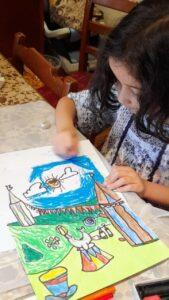Children are creative beings. But sometimes a lot of children think they are not artists because they think they can’t draw well. Oftentimes, I like to tell my students that if they make art, then they are artists. As parents or teachers, we need to know that children, like us, can get frustrated with their work.
A lot of times too, children will compare their work to others. They’ll tell themselves that other children are doing a much better job. Sometimes it helps to remind them that there are no mistakes in art and there is no better or worse. We all have different ways of expressing ourselves and our artworks should be as unique as we are.
How else can we help them and encourage them to make art they like?

Don’t fix their work or tell them they’re using the wrong colours. Children are sensitive beings and our words affect them. So we have to be careful about what we say, even if we meant it in the nicest sense. so instead of fixing their work, praise their efforts and accomplishments.
If they ask for help, don’t jump in and do the project for them. Instead ask them questions to help them work through their struggles. Ask them how they would like to fix this or what would they change.
Don’t draw on their paper. If you need to show them how to do something, use a different piece of paper. Guide them by saying let’s try this together. Then explain on your paper and ask them to follow along.
If they get frustrated or unhappy about their drawing, don’t tell them it looks great. Instead, help them find things they like about it by asking them what their favourite part of the drawing is. Or ask what they enjoyed about the process of making it even if they didn’t like the artwork itself. Encourage them to find things they like about their work.
Ask your child what it is they don’t like about the artwork and think of ways to fix it before throwing out the artwork. Sometimes, telling the child that the artwork looks fine can be frustrating. instead think of ways or creative solutions to fix the problem and let the child choose one.
Always make sure the lesson they are learning is age appropriate. Please don’t try a lesson designed for age 10 or 12 with a 6 or 8 year old, no matter how advanced you think your child may be. That’s setting them up for failure, frustration or at the very least boredom with the art project.

Remember that some children will have a higher standard for their work, while others won’t. No matter what standard they have for their efforts, remember this. Children will always have an emotional reaction to their work. Be positive and be gentle, the children will pick up on it.
Finally making art takes time, patience and practice. Remind them that not every painting will be perfect. Sometimes the project will turn out exactly the way they intended it to and other times it won’t.
If you found these tips helpful, share them with your friends and follow us on social media for more tips. Don’t forget to sign up for our newsletter for exclusive offers and other surprises too!
Explore. Evolve.


